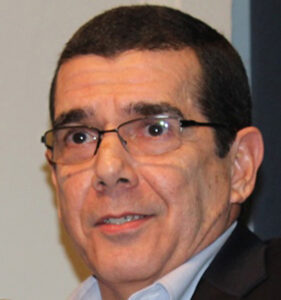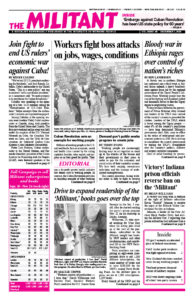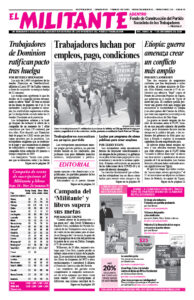
The U.S. blockade against Cuba is the largest, the most comprehensive economic war — and not only in economic terms — against any country. Its main purpose is to overthrow the Cuban Revolution.
We always quote from the Mallory memorandum. Lester Mallory was a bureaucrat in the U.S. State Department back in 1960. He wrote a memo saying, in essence, that the Cuban Revolution had broad support among the Cuban population, that there was basically no opposition, domestically, in Cuba. And that to overthrow the Cuban Revolution, the United States needed to make the Cuban people surrender by hunger, by imposing economic pressure.
That was well before the [1962] proclamation decreed by President [John F.] Kennedy imposing the embargo on Cuba. If we read that Proclamation 3447, the main argument used to impose the embargo on Cuba was about the relationship between Cuba and the People’s Republic of China as well as the former Soviet Union. But today the Soviet Union is not there anymore, and China is the largest trade partner with the United States.
This is a state policy. Sometimes people associate the blockade against Cuba with a particular president. The fact is, we’ve had 12 U.S. presidents enforcing the blockade.
I just want to mention how complex the whole structure of the blockade is. Several pieces of it are related to the Trading with the Enemy Act of 1917. And to the Foreign Assistance Act of 1961.
I mentioned Proclamation 3447 decreed in 1962 by President Kennedy. There are also the Cuban Assets Control Regulations of the Department of the Treasury imposed in 1963. You have the Export Administration Act of 1979.
There is the so-called Cuban Democracy Act, or Torricelli Act, of 1992. The U.S. government says this is simply a bilateral issue involving the United States and Cuba. Well, if you read the Torricelli bill, it’s quite clear they try to implement the blockade to apply to third countries. The Torricelli bill aims to limit trade relations with Cuba by American companies in third countries.
Then you have the so-called Helms-Burton Act, or Cuban Liberty and Democratic Solidarity Act of 1996. That name is a bad joke. It is probably the most comprehensive piece of legislation in regards to the embargo.
And you have Section 211 of the Emergency Supplemental Appropriations Act of 1999. That section is unique. Its purpose is to not recognize Cuban brand names in the United States.
Finally, there is the Trade Sanctions Reform and Export Enhancement Act of 2000, with new regulations for the blockade.
This blockade has been there for 60 years. Several senators and representatives in U.S. Congress have been trying to change the whole thing, or at least some part of it. So far they haven’t been successful.
That blockade remained in place during the Obama administration years. Even though we had then what is called a rapprochement — we established diplomatic ties and signed 22 Memorandums of Understanding covering different areas, from agriculture to the environment, and public health.
But the blockade — which is the core of United States state policy against Cuba — was implemented. During the Obama administration we had sanctions, other measures. Fines imposed on foreign banks to limit financial transactions against Cuba.
It’s important to remember. Even at probably the most positive moment we’ve had in bilateral relations in the last several years, the blockade was enforced and implemented.
Now, what has happened during the last four years under Trump’s rule? We’ve had roughly 235 new actions implemented against Cuba in a variety of sectors. It’s a policy to make the Cuban people surrender by economic pressure — by limiting the supply of oil and other commodities to Cuba.
The blockade is something that impacts every single sector in Cuban life, from education to public health to agriculture, to trade.
It also limits possibilities for people in the United States. Just to mention one example, the possibility to export U.S. agricultural commodities to Cuba, which would be a natural market.
You have seen how U.S. travel to Cuba had expanded. Roughly five and a half million Americans and Cuban Americans visited Cuba between 2015 and early 2019.
There is a large community of Cuban Americans in the United States, and they have suffered the impact of these regulations. Just in the last two years, 121 decisions were implemented by the U.S. government to limit travel to Cuba, to limit family remittances.
Sixty years of blockade is too much. Sixty years of a failed policy, of a fiasco — it’s a moment to try something else.
Mutual respect and reciprocity
You probably have questions or comments in regards to the outcome of the last elections in the United States. There is a renewed hope among Americans in terms of a new kind of relationship that can be built with Cuba.
We remain open to any kind of talks — if the principles of mutual respect and reciprocity are respected. Those are the two keys for any future relationship between Cuba and the United States. With the upcoming president or with any other administration in the future.
We have heard the public statements from the candidates. We have heard statements from people that may be associated with the new government. But Cuba doesn’t tailor a policy because someone was elected. We don’t tailor policies to specific people. The principles of our foreign policy are consistent.
We understand that we have and will have differences with the United States. We listed them in 2015 and 2016. But we do believe, for the benefit of our population, for the benefit of the world and the region, that we have to find common ground on several questions.
The blockade against Cuba has always been an act of war. But today it’s also a crime to maintain and enforce that blockade under the conditions of the COVID-19 pandemic. At no time, not once during the last year, did the current U.S. administration lift any measures. Just the opposite. They severely reinforced the limitations that ordinary Cubans have to face because of the blockade.
Hopefully, the common cause to fight COVID in the United States, in this region, in this hemisphere, would be an opportunity for all our countries to cooperate. Not only to find a cure, but to find a better future for our people.

